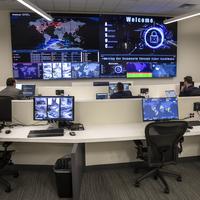Dr. Ruth Berggren, an infectious disease specialist with UT Health San Antonio, joined anchors Steve Spriester and Myra Arthur during Thursday’s KSAT Q&A on the 6 p.m. News to discuss COVID-19 reinfection with the new variant, omicron’s effect on frontline health care workers and precautions to take for those who start showing symptoms and can’t find a test.
Thursday’s COVID-19 numbers
The San Antonio Metropolitan Health District said the omicron variant has led to a three-fold increase in daily cases of COVID-19 with the seven-day moving average of new daily cases is now at 3,116.
ALSO ON KSAT.COM: 5 charts show COVID-19 surge in San Antonio
Metro Health’s COVID-19 dashboard showed an increase of 2,358 new cases on Thuesday. There were also six new deaths reported, bringing the total to 15 deaths over the past seven days.
There are 625 COVID patients in local hospitals, with 142 in ICU and 52 on ventilators. Metro Health’s dashboard shows there are 10% of staffed beds available and 65% of ventilators available.
“At the Health Science Center, our opinion is that we’ll probably see a peak in about mid-January. We expect it to steeply drop off, and we hope to be back to our prior baseline sometime in the first week of February,” Berggren said. “So we don’t expect it to be as long lived as, say, the delta surge that we had.”
See more of today’s COVID-19 statistics and city resources for the public here.
Frontline workers out of circulation after infection
Berggren said the health care workforce, as well as other industries, are taking a hit due to the surge of omicron cases.
“Vaccinated doctors and nurses are getting symptomatic from omicron. And when that happens, we have to take them out of circulation to protect the sick people in the hospital. So workforces are being affected. That is that is not a hypothetical,” she said during the KSAT Q&A. “It’s already happening, and we need to do everything we can to double down and make sure that we keep our society functioning, which means keeping all of our frontline workers, whatever frontline worker it may be, in good health.”
Reinfection amid omicron surge
Berggren said people have significantly less protection with omicron if they’ve had a different variant of COVID before and are reinfected.
“Previously, we were quoted that with a prior infection, you had maybe up to an 85% protection from the delta variant, and that was particularly true for the first three months or so after your infection,” she said. “…Well, guess what? Omicron is a whole new ballgame. Your protection from prior infection has fallen down as low as 19%. So from 85% protection for a few months, down to 19%. Do not count on your prior COVID infection to protect you from omicron. To be protected from omicron, you need to be fully vaccinated and boosted.”
What to do until you can find a test
The infectious disease specialist discussed with Spriester and Arthur during the Q&A what people should do after being exposed or coming down with symptoms and aren’t able to get tested.
“If you’ve had an exposure — you’re unvaccinated, you do need to go home and you need to quarantine if you are symptomatic and you can’t get a test,” Berggren said. “But if you think you’ve got COVID based on loss of smell or feeling achy or cough. Put your mask on and take yourself out of circulation. That’s going to do a lot of good, even if the tests aren’t available.”
Watch the entire Q&A interview with Dr. Berggren in the video player above.
Metro Health has announced the locations of three new no-cost testing sites
Alamo Colleges District Support Operations Building, 2222 N. Alamo St. 78215 – Opens Thursday, January 6 at 8 a.m. and will operate Monday through Friday 8 a.m. to 6 p.m.Palo Alto College Building 23 (Performing Arts Center), 1400 W. Villaret Blvd. 78224 – Opens Friday, January 7 at 8 a.m. and will operate Monday through Friday 8 a.m. to 6 p.m.St. Philip’s College, 1801 Martin Luther King Dr. San Antonio, TX 78203 – Opens Monday, January 10 at 8 a.m. and will operate Monday through Friday 8 a.m. to 6 p.m.
Metro Health says more testing sites will be announced as the locations are confirmed, and it will notify the public when they are expected to open. No appointments are necessary for testing at the new walk-up sites.
City health officials also offer the following testing guidelines
Consider using a self-test before joining indoor gatherings with others who are not in your household.A positive self-test result means that you have an infection and should avoid indoor gatherings to reduce the risk of spreading the disease to someone else.A negative self-test result means that you may not have an infection. Repeating the test with at least 24 hours between tests will increase the confidence that you are not infected.Ask your healthcare provider if you need help interpreting your test results.
Click here to access more information about other city no-cost testing sites.
Also on KSAT:
Here are the COVID-19 vaccine pop-up clinics taking place around San AntonioWhere to get tested for COVID-19 in San Antonio, Bexar CountyWhere to get a COVID-19 vaccine in San AntonioUS hospitals seeing different kind of COVID surge this time

